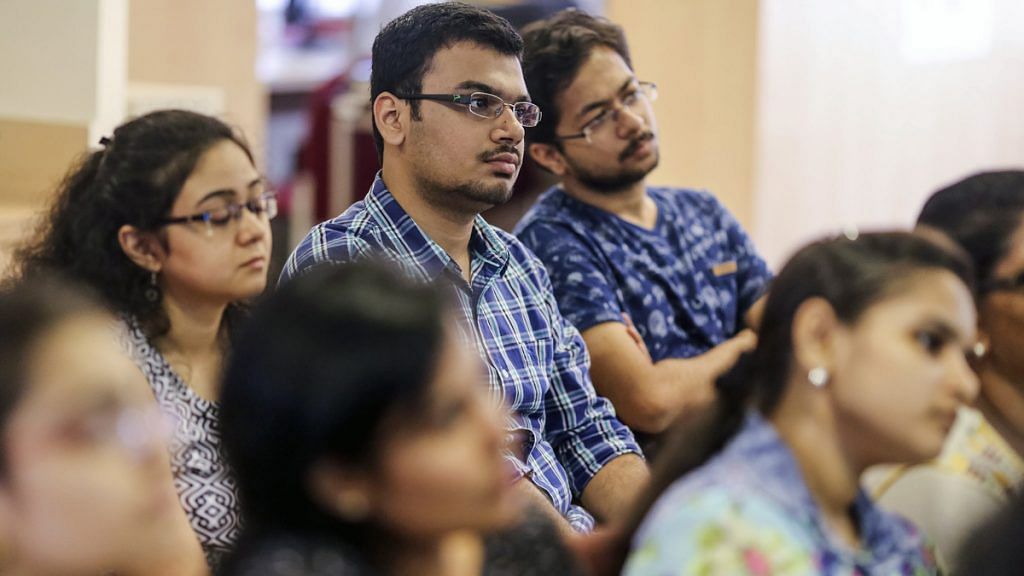A very well-known public school in Delhi invited me some months ago to speak at the graduation ceremony of Class 12 students. In a couple of months, they were expected to take the CBSE certified school-leaving examinations. During the course of the event, it became apparent that a large number of students had skipped the ceremony.
It turned out that most of the students from the so-called ‘science stream’ were away attending classes at a coaching centre that tantalisingly promised success in the IIT entrance examination. The principal’s lament was that these students were quite indifferent to the learning being imparted in their regular school.
A major source of concern is that the IITs themselves have not acquired much glory, yet they remain a mesmerising source of attraction.
No major invention or innovation that could make them stand out from other academic institutions seems to have occurred over the years.
One of the most damaging aspects of the culture spawned by this IIT mania is the effective neglect of true education that necessarily brings joy, enlightenment and self-fulfilment. This seems to be the case not only within the IIT systems, but also during the process of preparing for the IIT entrance examination.
Also read: Indian institutions such as IITs, IISc will soon make it to top 100: QS Rankings India head
Debunking the IIT myth
Perhaps it will be worthwhile to cite two IIT-related student experiences just to put things into perspective. The words of a student — expressed barely five years ago — while in his final year of study at probably the most well-regarded IIT, are deeply troubling.
He confesses that his three and a half years at IIT Bombay had left him with the feeling of a complete “academic void”. All he had learnt was how to mug up the syllabus for his examinations, equipping him with almost no additional knowledge during his stay at the institute.
Another former IITian, who seems to have retained his critical and analytical abilities, had some revelatory admissions to make on “What does my IITian tag actually mean”? And here is an extract from his answer: “I remember weeping at the loss of the lie that was the edifice of my life”.
Perhaps our schools are increasingly being seen as glorified coaching institutes. So, we seem to wittingly or otherwise harm the cause of education when we compel or entice young minds to aim for the IITs at the cost of worthy school experiences and education.
Also read: Critical data on India’s higher education is out but only Modi has hijacked headlines
Responsibility of schools
However, the moot point is whether our school-related educational experiences are worthwhile as an alternative to the process of preparing for the IIT entrance examination.
Of course, even if there were to be no IITs, the onus would still be on bodies like the CBSE to provide quality curricula.
Unfortunately, there is not enough evidence for this. During my time in school, we were required to analyse dozen-odd standard salts in our chemistry classes. These salts were known to all and sundry, and there was no genuine experimentation or discovery concealed in the process of analysis.
To my deep disappointment, I learnt a few days ago that the same salts seem to be in fashion under the benign gaze of the CBSE curriculum.
I am disappointed that not a single school has bothered to ask students to explore the various salts that lurk in the soil around their neighbourhoods or even at the school campus. How then will these students become creative and thinking individuals?
Also read: IIT-Bombay graduates are India’s most prized employees, IIT-Delhi’s come second
One step at a time
There are other severe shortcomings in our school curriculums. Schools tend to prohibit students from choosing and mixing different subjects from the three traditional streams of specialisation: commerce, science, and humanities. More importantly, these three streams and the subjects under them are taught and learnt in silo-like manner.
It would be impossible to study, say, a historical site like the Jantar Mantar, without the combined perspective of mathematics, history, physics and political science, or even architecture. And even if this were possible, then the other malady of ensuring that all learning takes place in the classroom through blackboards and textbooks without any ‘hands-on’ experience would take over.
To provide genuine school-level educational experiences, bodies like the CBSE will have to make radical changes: incorporating trans-disciplinary and ‘hands-on’ learning through projects focused on the needs and challenges of the real world.
The use of information technology, artificial intelligence, effective communication, and digital techniques along with the handling of data and analytical skills must be incorporated.
However, these measures will not bear fruit unless we ensure that the human resource involved is trained well, and our universities synchronise with what the CBSE and other boards of education incorporate.
The author is the former Vice-Chancellor of the University of Delhi, a distinguished mathematician and an educationist. Views are personal.
